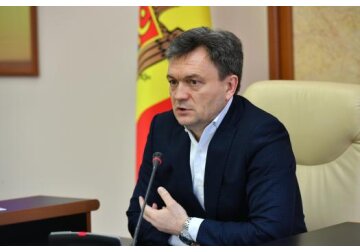
State of emergency in Moldova is to be extended throughout the country for another 60 days from April 5.
The relevant decision was approved by the government at Wednesday's meeting on the basis of the conclusion of the Commission for Emergency Situations. The government will send the proposal to the parliament for consideration. Interior Minister Ana Revenco recalled that parliament first declared a state of emergency throughout the country for 60 days from February 24, 2022, at the suggestion of the government, given the immediate threat to national security due to the war in Ukraine. Subsequently, the state of emergency was extended by parliamentary decisions, most recently for another 60 days from February 4. The measures taken during this period were necessary in order to be able to cope with the unprecedented situation in which the war in Ukraine resulted in the overlapping of the energy and migration crises with security threats, including those aimed at destabilizing Moldova. The actions of the government and the Emergency Situations Commission did not go beyond the authority granted by the parliament. Also, there was no interference in the exercise of the fundamental rights of citizens, and the government and the Emergency Situations Commission acted transparently, with deviations from the legal framework being proportionate and necessary for the management and overcoming of the emergency situation. Ana Revenco noted that the ongoing war in Ukraine has a direct impact on the critical infrastructure in the neighboring country. As part of the war effort, the Russian Federation has resorted to the use of missiles that risk flying over Moldovan airspace and even falling on the territory of our country, which can cause material damage and even threaten the lives and safety of citizens. Such incidents took place just recently, in February of this year. The security situation in the region remains unstable and Moldova remains the target of a wide range of manifestations of hybrid warfare, through which attempts are also made to destabilize the country, such as the promotion of falsifications and manipulations in the information space, including those concerning military intentions, incitement to hatred, xenophobia and separatism. These risks are further aggravated by a serious, unprecedented situation in the justice sector, in which the functionality of the judicial institutions is affected; attempts to block them are also fueled by external forces. At the same time, there is an increase in illegal migration to the territory of Moldova, both by Russian citizens (following the mobilization announced in the Russian Federation), and by citizens from other states with an increased risk of illegal migration. At the same time, due to the prolongation of the war and unpredictability of development of hostilities there is a risk of new significant inflow of people from Ukraine, the flow of which may exceed the capacity of state border checkpoints, therefore, Moldovan authorities still need mechanisms and levers to manage such events and the possibility of prompt allocation of financial and human resources. According to the data of March 26, 2023, there are more than 88 thousand refugees from Ukraine, including 44 thousand underage children on the territory of the Republic of Moldova. The head of the Ministry of Internal Affairs noted that there is also an urgent need to ensure Moldova's security through the prism of preventing the illegal financing of subversive activities against the state. With a draft regulatory act currently being developed that would fix a national mechanism for the transfer of specific categories of international sanctions (the model of the Magnitsky Acts from other countries), the mechanisms for transferring international sanctions provided for in the provisions of the Emergency Situations Commission must be maintained until this draft is finalized and adopted. Significant risks remain in the energy sector as well, in terms of gas and electricity supplies. Ana Revenco stressed that due to the fact that the orders of the Emergency Situations Commission are temporary in nature, in case the state of emergency is not extended, there is a risk of blocking a number of processes/mechanisms (including the cancellation of a number of derogations from existing regulations) established by the Commission, which contribute to the energy security of the country. Given the main risks and threats, such as energy, humanitarian, social and security challenges, including in the justice sector, the government considers it necessary to extend the state of emergency, so that Moldovan authorities are able to promptly intervene if necessary to take additional decisions to those provided by the existing legal framework, as well as to maintain the mechanisms adopted so far by the Emergency Situations Commission in order to prevent national security risks and manage the flow of refugees. // 29.03.2023 – InfoMarket







